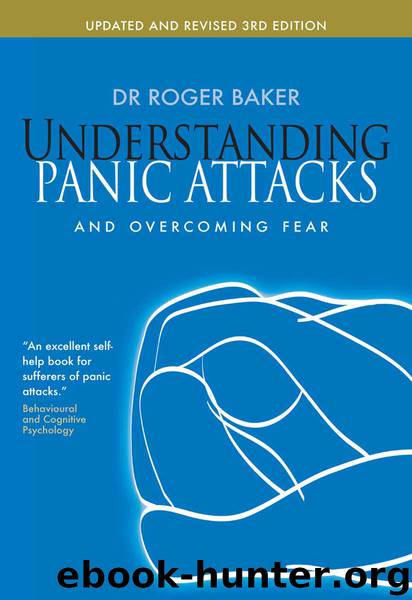Understanding Panic Attacks and Overcoming Fear by Roger Baker

Author:Roger Baker
Language: eng
Format: epub
Publisher: Lion Hudson
Published: 2011-06-25T16:00:00+00:00
“I want to cry as I’m writing most of the answers. The health visitor says I should cry a lot more. I did a bit when she was here last. I feel I’ve got everything bottled up inside me and it could explode and I couldn’t cope. If I do cry, I feel a bit better, but also it’s scary because it feels like a panic attack coming on. I think I should let myself cry a lot more… I usually run out of the room and put on the TV or blast out a CD really loud to drown my feelings.”
KATY’S EMOTIONAL PROCESSING STYLE
I have described these sections of the first few sessions with Katy (who later overcame her panic) to illustrate the important role of emotions in the development of panic attacks.
Let’s look at Katy. She had a long list of “negative life events”: she had a serious argument with her mother one year before, resulting in their separation; she left home; she had an affair; she moved into a flat with a young baby; she lost her independence – she lost social contacts; she could not get out; she was unable to make sufficient money to live properly; and the rent was due.
Katy, like many panic sufferers, had not made any connection in her mind between these events and the panic attack. Why not? Well, there is the obvious point that panic attacks are so physical, so bodily, so somatic, so much like a sudden illness that you tend not to think of emotional issues. Also, there was no obvious connection in time – her panic attack had occurred on 19 May and all these other life events had occurred weeks or months before. So in these two senses, the connection was not obvious. But let’s look a bit deeper – at Katy’s style of handling emotions, or should we say her style of not handling her emotions.
Although she was clearly going through a lot of turmoil she found it very difficult to identify her emotions. At first, when I asked her how she felt about being in the flat all day, she replied, “Not good,” a very general description of emotional feelings. After quite a lot of quizzing she was able to identify it as “feeling trapped”.
When discussing her mother “kicking her out of home” with the health visitor, she started to cry, but said, “I still don’t understand why it hurts me so much.” She found it difficult to identify and label her feelings. She certainly was experiencing great distress – you only needed to look at her face to see the turmoil. She could feel all the bodily sensations of that distress – tension, high arousal, breathlessness, heart racing – but did not naturally think in terms of emotional meanings, such as anger, feeling trapped, depression.
As she had not identified and labelled her emotional feelings it made it very difficult for her to connect these feelings to events in her life. The last part
Download
This site does not store any files on its server. We only index and link to content provided by other sites. Please contact the content providers to delete copyright contents if any and email us, we'll remove relevant links or contents immediately.
Should I Stay or Should I Go? by Ramani Durvasula(7669)
Why We Sleep: Unlocking the Power of Sleep and Dreams by Matthew Walker(6726)
Fear by Osho(4740)
Flow by Mihaly Csikszentmihalyi(4698)
Rising Strong by Brene Brown(4464)
Why We Sleep by Matthew Walker(4447)
The Hacking of the American Mind by Robert H. Lustig(4383)
How to Change Your Mind by Michael Pollan(4357)
Too Much and Not the Mood by Durga Chew-Bose(4348)
Lost Connections by Johann Hari(4188)
He's Just Not That Into You by Greg Behrendt & Liz Tuccillo(3900)
Evolve Your Brain by Joe Dispenza(3679)
The Courage to Be Disliked by Ichiro Kishimi & Fumitake Koga(3504)
Crazy Is My Superpower by A.J. Mendez Brooks(3401)
In Cold Blood by Truman Capote(3386)
Resisting Happiness by Matthew Kelly(3341)
What If This Were Enough? by Heather Havrilesky(3311)
The Book of Human Emotions by Tiffany Watt Smith(3309)
Descartes' Error by Antonio Damasio(3279)
